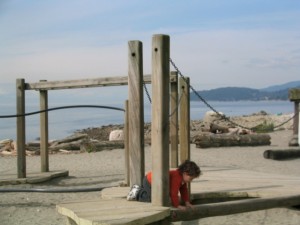Posts Tagged ‘Teachers’
From Job Action To Job Action To … ?
When I chose to run as a candidate in the 2011 municipal elections, the K-12 public education system in British Columbia was embroiled in job action.
Almost three years later, the public education system in British Columbia is once again contending with a job action which many are calling the worst ever for the sheer rancour of the debate, the barbed rhetoric which abounds, and the crumbling relationships.
In other words, my entire term as a Trustee on the West Vancouver Board of Education has been characterized by the lurch from one job action to another.
While bargaining has chewed away at my time as a Trustee, it’s insatiable appetite has also served as an obstacle to discussions and innovations on a number of educational topics.
Why?
Because if you’re consistently caught up in trying to clean up the mess your guests have made with the appetizers, you’ll never have the chance to sit down with your company to enjoy the main course.
If our focus is concentrated on bargaining issues, what are we not talking about? Here’s a short-list of “big picture” items which I feel are overshadowed by the labour situation whether at a local level or provincially (in alphabetical order):
Accountability
- which Ministry reports are essential and which ones aren’t?
- is there a way to simplify school district financial reporting to ensure better utilization of staff time and resources without sacrificing the integrity and thoroughness of the information required?
- aside from the issue of underfunding, is it time to review the current funding formula?
Assessment (I know much has been done in this area and some school districts have already begun experimenting with different approaches, but I’m afraid that work has been disrupted and the information won’t be available for sharing as best practices with others.)
- what should report cards look like at each level in the K-12 system?
- how do we continue to move forward on implementing models of formative assessment?
- is there a different way to organize credits at the high school level to enable a more flexible route to graduation rather than one based strictly on work in school or on a progression through grade levels?
Age Groupings
- is grouping students according to their age still the desired approach to education?
- how do we balance the advantages of early learning with the fact that for some students a later start into a formal school environment may be more desirable?
- do all students require a full five years of secondary education or should there be a fast-track option for some learners?
Calendar (some districts are already working with different calendars)
- do we have to start school in September and stop in June with the traditional breaks at the end of each calendar year, for spring break, and so on?
- are balanced calendar models more successful for students and their families?
- what are the logistical barriers to changing the calendar within a district? That is, does it work well to have one or more schools on a different calendar or does it work better to change all at once?
Community Links
- how do we break through the walls between our communities and our schools to improve and increase relevancy and connections?
- what sort of partnerships can we build with our community without compromising the integrity of our public education system?
- how do we draw on the expertise and skills of our community members to further enhance and support school learning and the work of our educators?
These are some topics I yearn to delve into along with other issues such as the new curriculum, pre-service requirements for future educators, and the structure of practicums for student teachers.
Oh, and what exactly is a teacher’s role and what do we even mean by education in today’s world?
And while I believe that a negotiated settlement is the best foundation from which we may be able to enter into a progressive and enlightening discussion on many of these issues, it makes me very sad to acknowledge that the time needed to repair relationships once a deal is signed means we may not have the time we need to talk about such things substantively let alone implement them before we’re at the bargaining table again!
In the meantime, school districts continue to strive to do the very best for the families of this province but if each electoral mandate continues to be a Ben Hur-like chariot race from one set of failed negotiations to another, we will — all of us — have failed in our duty to build a better world for our children.
It will be a collective failure of imagination.
2014 Bargaining: A Primer On Timing
As one school year draws to a close and another looms, I know many are trying to understand where we are when it comes to bargaining.
Why?
Because families plan ahead and they need to factor in those issues which may have an impact on their lives and the lives of their children. One of those issues is the outcome of labour negotiations in the public education sector and the current status of job action.
I won’t attempt to explain the positions of the parties; I just want to provide some clarity around timing as I see it.
The government and Boards of Education, via the BC Public School Employers’ Association (BCPSEA), are currently negotiating with the BC Teachers’ Federation (BCTF) on a new contract.
Both sides have stated their interest in achieving a negotiated settlement by the end of June 2014. It’s not known at this point how long the deal would be for although the last public position of the BCTF was for a four-year term while the government maintains that a 10-year term is its goal.
Earlier this spring, in response to what was seen as lack of movement at the bargaining table, the BCTF took a membership-wide vote which approved a three-phase plan for job action:
•Phase 1 – a province-wide disruption of communications with administration and the disruption of supervisory duties. The BCTF has activated Phase 1 which is currently in force.
•Phase 2 – This escalation, which is proposed but which has not been initiated, would involve rotating one-day strikes. If the BCTF invokes Phase 2, they will provide 48 hours notice to any District which will be subject to a one-day walkout.
•Phase 3 – full work stoppage. If Phase 2 is invoked and if there is still no progress at the bargaining table, the BCTF will contemplate escalating the job action. Prior to doing so, they have committed to holding another vote for their membership to approve the plan. If at that point the union gets majority support from its members for a full work stoppage, it will be required to supply Districts — and consequently families, guardians, and caregivers — across the province with three business days’ notice.
That’s a summary of where we’re at today.
Between now and the end of this school year we may or may not see a settlement and we may or may not see an escalation of the job action. Unfortunately, that’s the uncertainty with which we must all contend.
If a settlement is reached by June 30, then it will encompass a multi-year term and school will begin in September without any issue.
If a settlement is not reached by June 30, I think there are two scenarios we’ll face although there are probably others which are just as likely. We’ll either have an escalation to Phase 2 of the job action before the end of this year or, depending on how things unfold and allowing for the summer break, we could have some disruption at the beginning of the 2014-2015 school year.
Given the BCTF’s commitment to holding a full vote, I can’t imagine getting to Phase 3 of the job action prior to June 30 unless the BCTF were to leapfrog the idea of rotating strikes — and that would be publicly unpalatable — or the time lapse between the final two phases were significantly compressed.
In the event of a full work stoppage, I believe the government would act swiftly and that would likely mean the least promising outcome of this lingering dispute: a legislated settlement which sends teachers back to work while leaving much unresolved.
A shut down of the public education system would be disproportionately disruptive to students. That is, there will be students — such as my child — whose time will be filled with alternative plans and activities. However, there will be many, many students and families who will be faced with significant consequences and to whom a strike will represent hardship.
And that’s why I strongly urge BCPSEA and the BCTF to tread carefully, yet with a sense of urgency, and to settle by June 30, 2014.
If you’re interested in more of the background to public education bargaining, here’s a very well-written recent article by Katie Hyslop in the Tyee.
An Open Letter to the Premier of British Columbia
Dear Christy,
I hope you don’t mind me calling you Christy. We’ve never met, but you seem to pride yourself on connecting personally with British Columbians, so I’m sure you won’t mind my use of your first name.
I think it’s critically important for women to be involved in politics at all levels of government. I ran for the first time in 2011 and was honoured when the residents of West Vancouver elected me to be one of their trustees to the Board of Education.
Given my belief that women in politics are agents for change, it is with some hope that I viewed your election as leader of the BC Liberal Party and, subsequently, as Premier.
The opportunity to have a woman at the helm of the governing party seemed to me to be an opportunity to do things differently, to do things in a manner which is more collaborative and more substantive. To rise above partisanship and to focus on the overall good of our province and not merely to wallow in ideology.
Since then I’ve grown increasingly disillusioned by your approach to politics and governing.
Why?
Because rather than being an innovator in politics, you seem to be perfecting the art of politics by photo opportunity and soundbite rather than by policy and depth.
This is perhaps most evident in your approach to public education in our province and your reaction to the decision by Justice Griffin of the BC Supreme Court.
Essentially, Justice Griffin reaffirmed her earlier finding that legislation in 2002, enacted when you were Minister of Education, was unconstitutional and that the remedies subsequently introduced were insufficient.
This means that hundreds of millions of dollars that should have been invested in the public education system have been diverted. Not only that, but in the intervening twelve years, increases in costs, inflationary increases in conjunction with downloaded costs, have outpaced increases in funding which means that Boards of Education throughout BC have done more and more with less and less.
The continuing success of Boards should not be taken as an indication that funding is adequate. Rather, it is a testament to their resilience, and the resilience of all the partner groups including parents, that our students have continued to thrive and excel.
Imagine the success we would have had if you had maintained funding according to the terms of the 2002 collective agreement!
We would have had greater equity across school districts.
We would have more successfully addressed the needs of our most vulnerable students.
We would have kept more schools open.
To argue now, in light of the court judgement, that the solution is not affordable and that it will cause irreparable harm to students is to focus on being right rather than doing what’s right.
I’m confident that Justice Griffin was not counting on a time machine to carry us back in time and I recognize that filing an appeal is an option available to you in our legal system. I also believe the time has come for you to show leadership and to do things differently.
Negotiate a new contract with the BCTF, with new parameters for September 2014, and agree to provide the additional funding which will be required to fulfill the terms of a new agreement.
That, Christy, would reaffirm my belief in the power you have, as a woman in politics, to make a difference and, in particular, to make a difference which will undoubtedly benefit students in BC’s internationally recognized public education system.
The Value of a Shock
In June 2013, a Grade 8 teacher invited me to participate in an event she had organized for her English class.
I accepted, with no qualms, to be a talking book. That is, an individual with whom students could converse. A living book providing real-time dialogue.
On the day of the event, each living book was guided to a different spot in the Rockridge library. The students, in small groups of five or six, rotated from one station to the next on a timed basis. They had spent time preparing for their roles as interviewers and the evidence of how much time their teacher had spent helping them get ready was clear.
Many of the questions they asked me focused on education.
“Is high school the best years of our lives?” One of my favourite questions, to which I answered, “No.” In my view, I explained, high school may be a pinnacle of experience for some, but it was not necessarily so for all. It hadn’t been for me.
One young woman asked for my advice on how best to prepare for university. I didn’t mind this question the first time it was asked, but by the second or third time it was broached, I’d had enough. I suggested that since they were only in Grade 8 they may be better served by focusing on what they had to do now. They had time to agonize over the rest.
There was one question which resonated with me the most. I remember it as “what do you think is the purpose of education?” but in her thank you letter the young woman who’d posed the question wrote it down as “what makes you so passionate about education?” The exact form of the question doesn’t matter because it was her interpretation which has made this into a cherished memory.
“Your answer shocked me. It was not an answer that I expected. You are not passionate about education because you think it makes people smart for a better job in the future, that was what I expected. Instead, you said that education makes us better people. … This is a moral that I will carry with me for my upcoming school years.”
And I do; I believe that education is about making each of us better.
That’s why the chorus for choice in the public education system sometimes rings false. Because those who sing that chorus the loudest are trying to draw a straight line from their children’s education, even as far back as kindergarten and earlier, to success in their lives as adults. There are connections and correlations between the two, but I believe we do a disservice to our young people when we present life as a simple equation of “if you do this, then you will get, or you will be, this”.
Life is complex and nuanced.
Life doesn’t always unroll in a straight line.
And that can be a shock.
And in the face of a shock like that, sometimes all we have to rely on is being the best person we can be.
The Tracks Of Her Tears
I saw the mother of a young man cry last week.
Her tears weren’t tears of grief and loss.
Rather, the tracks of her tears captured a story of love, bewilderment, perseverance, disappointment, faith, despair, relief, pride, and thankfulness.
Why?
Her son had graduated.
Such a pedestrian sound to this accomplishment: her son had graduated.
But it’s only pedestrian because high school graduation has become an expected (minimal) norm in our world.
However, it’s a mistake to assume high school graduation is automatic even in a community such as West Vancouver which boasts a 97% graduation rate.
There’s the perception that all the children in this community will make it, that they all have an easy ride.
Wrong.
It’s a mistake to assume that the glittering mantle of expensive housing, disposable income, and stable family is the reality for each child. It’s wrong to assume they will thrive in our high schools.
That’s why we have ACCESS.
Located at West Vancouver Secondary School, ACCESS
“… is an alternate school program designed to provide an opportunity for students who require this unique setting to complete the requirements for high school graduation.
In addition to the basic academic program, ACCESS also provides students with the following opportunities.
- 10 day Bowron Lakes wilderness experience
- Participate in various local outdoor activities
- Access to community youth services
- Work experience
- Apprenticeship
Admission is through an interview process…”
The ACCESS grad luncheon this past week was an opportunity to recognize the accomplishments of remarkable young people who had done what is expected of many, but which was not a guaranteed outcome for them.
And in a society which increasingly favours conformity and compliance, they did so while holding on to their unique forms of self-expression, their standout personalities, and saying “I’ll do what you ask, but I’m doing it my way”.
That is strength of character, courage, and conviction.
At ACCESS collaboration is a lifeline. There’s a dedicated team of teachers and youth workers who guide these students and who are joined by representatives from community partners such as the District of West Vancouver Community Services, the West Vancouver Police Department, Vancouver Coastal Health, the Ambleside Youth Centre, and local businesses.
In hindsight, maybe the tears of that young man’s mother did denote loss of a kind. They reflected the grief she’s carried with her knowing her son’s journey has been immeasurably tougher than many of his peers.
But there was more in her eyes.
There was joy. Despite the obstacles, her son had reached this milestone and was publicly recognized for doing so.
There was hope. Hope that it was, after all, going to be fine.
What more could I ask for than to be associated with a system which provides joy and hope to those who are at risk and vulnerable?
A system that is not taken in by the appearance of the community’s “perfection”, but which understands that unless our “diamonds in the rough” have a place to call their own, then our claims of excellence will ring hollow.




